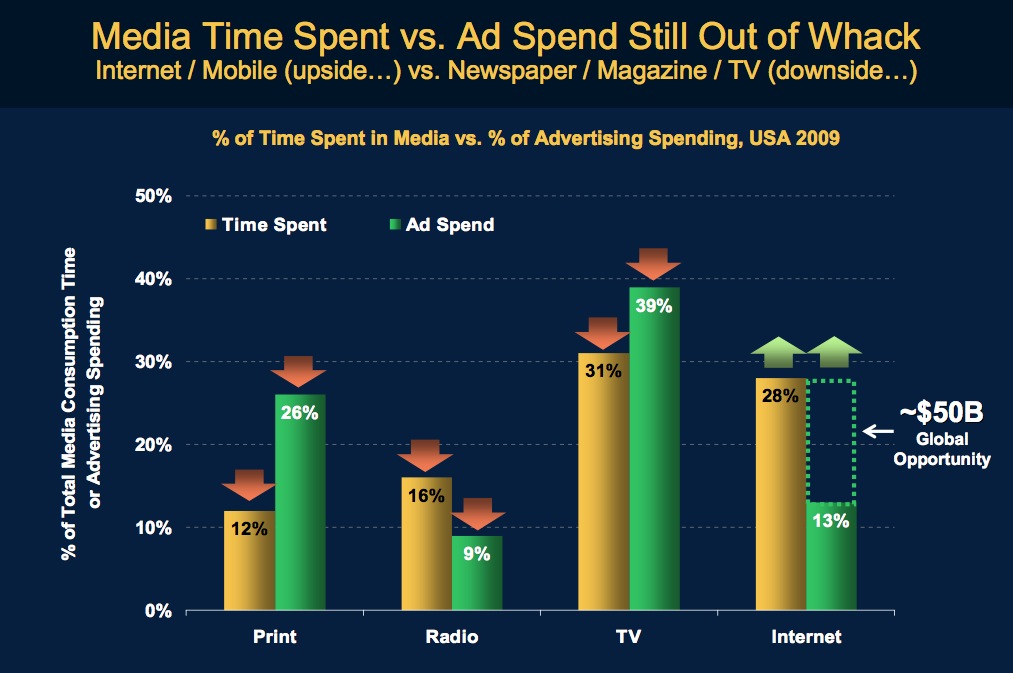Meeker’s Top Internet Trends: Online Advertising Undervalued
by Steve O'Keefe on November 17, 2010

Mary Meeker runs the global technology research team as a managing director of investment giant, Morgan Stanley. When Meeker talks, the market listens, and she was saying plenty at the recent Web 2.0 summit in San Francisco.
On Tuesday, November 16, Meeker shared her picks for the top Internet trends, backed up with some of the most cleverly crafted stats I’ve ever seen. Among the revelations: Print publications occupy only 12% of the amount of time consumers spend with media, yet account for 26% of advertising spending. This does not bode well for the future of advertiser-supported print media.
On the other hand, Meeker’s stats show that the Internet takes up 28% of people’s time for media, yet draws only 13% of advertisers’ budgets. She says there’s $50 billion too little being spent in online advertising.
Mashable’s Ben Parr summarized Meeker’s misallocation thusly: Facebook is “the most under-monitized asset in online advertising.” According to Meeker’s stats, social networking is earning a mere 55 cents per thousand impressions (CPM) from advertisers. Compare this to CPM’s of about $2.70 for the majority of websites that accept display advertising. Also grossly undervalued, according to Meeker, are display ads embedded in email, which earn only 89 cents CPM.
Parr was modest enough not to mention that Mashable ranked as one of the Top 10 brands on Twitter, coming in at position number 10 — right behind the National Basketball Association (NBA) and just ahead of Martha Stewart.
Another slide in Meeker’s presentation compared the number of people who “like” brands on Facebook with the number of viewers for popular television programs — and the CPMs associated with those TV shows. Zynga’s Texas Hold’em Poker leads the likes on Facebook with 27.2 million, which is roughly equivalent to the number of American Idol viewers. Whereas display ads on Facebook cost a mere $0.55 per thousand impressions, American Idol charges $30. We profiled Zynga founder Mark Pincus here on the Minitrends blog last month, where he talked about the importance of good eating habits.
Some of the other trends mentioned in the book, MINITRENDS, which also caught Mary Meeker’s eye, include the growth of virtual worlds. Meeker favorably compared the Japanese social networking site, Tencent (637 million active users), with Facebook (620 million annual visitors). The difference? Tencent is a virtual world using avatars. The shocking stat that caught my attention: over $1.4 billion in virtual goods have been sold on Tencent! Those are real yen shelled out for virtual merchandise such as outfits for avatars.
Another shocking stat: Seven of the top 15 Internet companies by market capitalization in 2004 are not in the top 15 today. Punishment is swift for those who do not stay on the edge of innovation. Case in point: Nokia and RIM held 70% of the smartphone market as recently as 2008. Today, that market share has dropped to 52% while Google (Android) and Apple (iPhone) have gone from nothing to gobbling up 42% of the market.
Despite a Morgan Stanley copyright notice, Mary Meeker’s slideshow seems to be everywhere online. You can find it at Mashable and TechCrunch, along with some very cursory commentary.
STEVE O’KEEFE
News Editor, Minitrends Blog
Source: “The Unprecedented Rise of Apple iOS and Other Internet Trends,” Mashable, 11/16/10
Source: “Mary Meeker On Ten Questions Internet Execs Should Ask And Answer,” TechCrunch, 11/16/10
Image from Morgan Stanley, used under Fair Use: Commentary.
Comments
One Response to “Meeker’s Top Internet Trends: Online Advertising Undervalued”
Got something to say?














[…] Google. In a previous post on this blog, we cited Morgan Stanley’s Mary Meeker as noting that seven of the top 15 Internet companies by market capitalization in 2004 are not in the top 15 today. The primary reason for the demise of [Fortune 100] companies has been a failure to recognize and […]